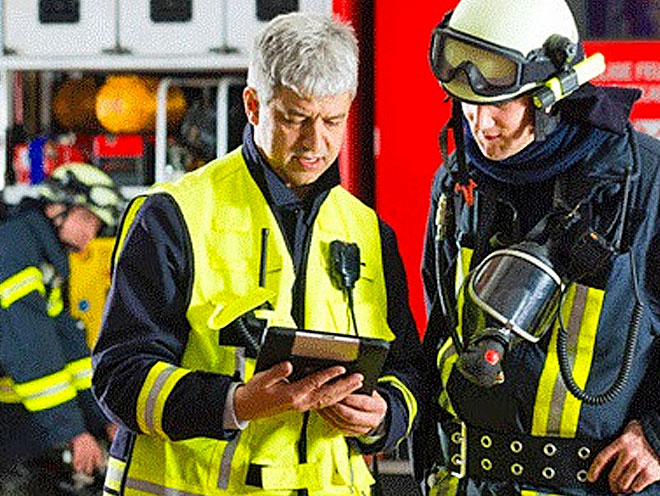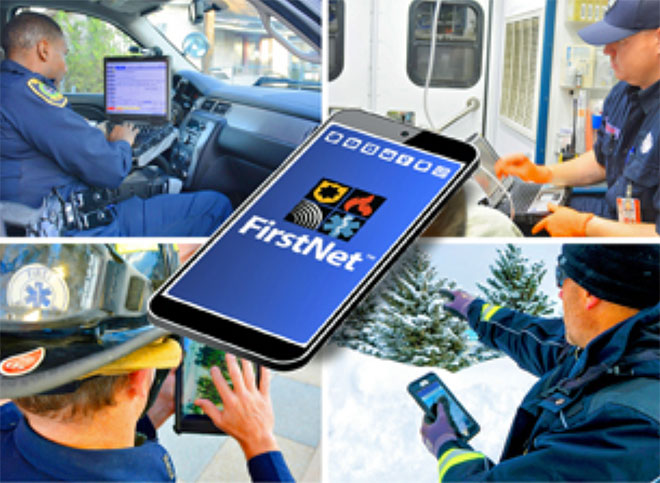
With last week’s close of the FirstNet opt-in/opt-out period, the unanimous decisions of states and territories across America are in – making it a big week for public safety.
Fifty states, 2 territories and the District of Columbia have opted in to the First Responder Network Authority and AT&T* plan to design and build a dedicated wireless broadband network for their respective public safety communities – giving first responders nationwide a groundbreaking new choice for their communications.
(Lives depend on first responders’ ability to communicate in disaster and emergency. That is why FirstNet was created – to develop a wireless, mobile network to modernize public safety communications and keep first responders connected when it counts the most. Courtesy of FirstNet and YouTube)
FirstNet is America’s first-ever nationwide public safety broadband network.
The recommendation for a separate, dedicated network for first responders was made by the 9/11 Commission based on the communication challenges public safety experienced during the September 11, 2001, terrorist attacks.

Since then, it’s been clear that the needs of public safety demand more than the networks of the past.
“Our FirstNet offering will forever change the way first responders communicate,” said Chris Sambar, senior vice president, AT&T – FirstNet.
“Securing 53 opt-ins is significant for the public safety personnel that this network will serve.”
“And we’re honored to give first responders across the country quick access to this life-saving solution.”
FirstNet – purpose built with and for public safety – brings first responders their own world-class network to help them connect to the critical information they need every day and in every emergency.

“With every state saying `yes’ to the FirstNet plan, America’s first responders now have a nationwide interoperable network they can rely on 24/7/365 – like their mission,” said First Responder Network Authority Chief Executive Officer Mike Poth.
“I applaud these governors for their decision and congratulate public safety for its advocacy and partnership throughout the process.”
“With more than 50 states and territories participating in FirstNet, public safety is assured of an enduring, self-sufficient network to serve them for years to come.”
Many states spent an exhaustive amount of time researching their options.
New Hampshire – for example – spent more than 2 years exploring vendors who could deliver its statewide public safety broadband network.
(Find out about FirstNet State Plans in 100 Seconds. Courtesy of FirstNet and YouTube)
Ultimately, New Hampshire and the other states that issued requests for proposal opted in, indicating that we offered public safety the best solution with the least risk.
Decisions from the 3 Pacific territories of American Samoa, Guam and Northern Marianas Islands are not due until March 12, 2018.
What’s Ahead in 2018

Now that opt-in decisions are in, the First Responder Network Authority is expected to give AT&T the official green light in early 2018 for its aggressive network build, including new site builds.
This is expected to help cover unserved or underserved areas and drive investment and job creation.
- AT&T will spend about $40 billion over the life of the contract to deliver FirstNet.
- And the First Responder Network Authority is providing success-based payments of $6.5 billion over the next 5 years as well as 20 MHz of high-value spectrum to support FirstNet’s build.
FirstNet will also bring first responders a host of new capabilities in 2018 which will help make their communications simpler, safer, faster, more collaborative and more secure.
(From Baltimore to Oklahoma to Hawaii and points in between, public safety leaders are speaking out about why they need the FirstNet network. Courtesy of FirstNet and YouTube)
“FirstNet is the network for public safety,” Sambar said.
“2017 was about planning, preparing and moving quickly to bring public safety a meaningful option – one they can rely on without delay.”
“We’ll build on that groundwork in 2018 with transformative capabilities that will make FirstNet the most valuable communications system for first responders.”
“And since this is likely the biggest innovation that most first responders will see in their careers, we can’t wait to bring it to as many emergency responders as possible.”
Planned advancements that AT&T’s FirstNet subscribers can expect in the new year are:

- Increased coverage and capacity from AT&T’s FirstNet build.
- Plus, access to mobile dedicated network assets that can be deployed for additional coverage and support when needed.
- Launch of the AT&T-built FirstNet nationwide, dedicated evolved packet core network with end-to-end encryption.
- All FirstNet traffic will be routed through this multi-million-dollar core to give first responders the separate, highly secure, non-commercial network they deserve.
- Access to a dedicated Security Operations Center, offering 24/7/365 support.
- Roll out of a range of next-generation public safety tools.
- This includes mission-critical push-to-talk and device offerings, like BYOD, to bring value to urban and rural first responders.
- Continued innovation with the FirstNet app ecosystem.
- This will be supported by FirstNet-focused hackathons in the new year to help fuel development.

“As first responders, we face an incredible amount of risk every day,” said Houston Police Chief Art Acevedo.
“So, to have a network that is focused on driving innovative capabilities to improve our safety is game changing.”
“2017 was a pivotal year for public safety.”
“And with the advancements planned for 2018, it’s only going to get better.”
















